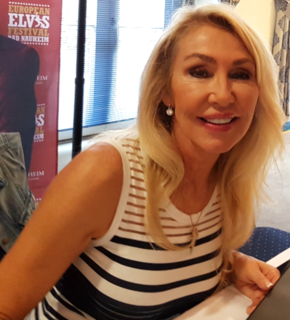A Quote by J.R. Ward
The sense that in his mother's view, he had let down his family just by being who he was... was a failure of acceptance that he was never going to get over. He just wanted to live, honestly and out front, with no apology. Like everyone else. To love who he loved, be who he was… but society had a different standard, and as he always feared, his parents were a part of that.
Related Quotes
I'm serious, Harry, don't go." But Harry only had one thought in his head, which was to get back in front of the mirror, and Ron wasn't going to stop him. That third night he found his way more quickly than before. He was walking so fast he knew he was making more noise than was wise, but he didn't meet anyone. And there were his mother and father smiling at him again, and one of his grandfathers nodding happily. Harry sank down to sit on the floor in front of the mirror. There was nothing to stop him from staying here all night with his family. Nothing at all.
As a child, he had hardened his heart and learned to take their punches. He had learned to spit back and take down anyone who cast a jaundiced eye or who made a comment about either him, his mother, or his sister. He’d told himself that he didn’t need anyone’s love or caring. And so he had learned to live like a feral animal, always ready to strike out when someone tried to touch him.
Billy covered his head with his blanket. He always covered his head when his mother came to see him in the mental ward - always got much sicker until she went away. It wasn’t that she was ugly, or had bad breath or a bad personality. She was a perfectly nice, standard-issue, brown-haired, white woman with a high school education. She upset Billy simply by being his mother. She made him feel embarrassed and ungrateful and weak because she had gone through so much trouble to give him life, and to keep that life going, and Billy didn’t really like life at all.
His parents never talked about how they met, but when Park was younger, he used to try to imagine it. He loved how much they loved each other. It was the thing he thought about when he woke up scared in the middle of the night. Not that they loved him--they were his parents, they had to love him. That they loved each other. They didn't have to do that.
He felt safe with her. He'd never been safe with another human being, not since he'd been taken as a child from his home. He'd never been able to trust. He could never give that last small piece - all that was left of his humanity - into someone else's keeping. And now there was Rikki. She let him be whatever he had to be to survive. She didn't ask anything of him. There was no hidden motive. No agenda. Just acceptance. She was different - imperfect, or so she thought - and she knew what it was like to fight to carve out a space for herself. She was willing for him to do thar.
Depending on the year or the therapist he was seeing, he'd learned to ascribe just about every facet of his character as a psychological reaction to his parents' fighting: his laziness, his overachieving, his tendency to isolate, his tendency to seduce, his hypochondria, his sense of invulnerability, his self-loathing, his narcissism.
Christian's family lived under the shadow cast by his parents. They had purposely become Striogi, trading thier magic and mortality to become immortal and subsist on killing others. His parents were dead now, but that didn't stop people from not trusting him. They seemed to think he'd go Strigoi at any moment and take everyone else with him. His abrasiveness and dark sence of humor didn't really help things, either.
For I wondered that others, subject to death, did live, since he whom I loved, as if he should never die, was dead; and I wondered yet more that myself, who was to him a second self, could live, he being dead. Well said one of his friend, "Thou half of my soul"; for I felt that my soul and his soul were "one soul in two bodies": and therefore was my life a horror to me, because I would not live halved. And therefore perchance I feared to die, lest he whom I had much loved should die wholly.
We live in such a corporate world where everyone is passing the buck, it seems to me. Therefore I like stories where the individual takes responsibility for BEING the individual, and not just for himself, but for his comrades, his society and ultimately for his country. Ultimately, we can all learn a lesson from that and not be browbeaten by the corporate world which is taking over.
I fell in love with you," he said, "because you were one of the bravest people I'd ever known. So how could I ask you to stop being brave just because I loved you?" He ran his hands through his hair, making it stick up in loops and curls that Clary ached to smooth down. "You came for me," he said. "You saved me when almost everyone else had given up, and even the people who hadn't given up didn't know what to do. You think I don't know what you went through?







































